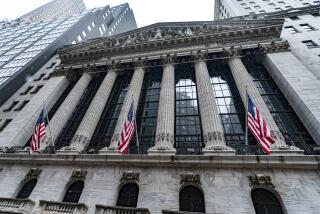Apple’s profit rockets 125% and may soar even higher
Apple Inc.’s 125% jump in quarterly profit stunned Wall Street, but it may be just a prelude to even bigger gains ahead.
Apple managed to post a record $7.3 billion in fiscal third-quarter earnings despite not having released a blockbuster product in nearly six months. Now as the company prepares to roll out a slate of new products — including a new iPhone, Macintosh computers and a new mobile operating system — analysts say Apple could post larger profit in the second half of the year.
“From now until the end of the year, I can’t think of a time when they’ll have a stronger few months of new products,” said Andy Hargreaves, a senior analyst at Pacific Crest Securities.
In addition to new products, Apple has been pushing sales of its devices overseas, including in the world’s largest consumer market, China. Apple said its revenue in China, Hong Kong and Taiwan combined has grown sixfold in just the last year and now accounts for about 15% of the company’s quarterly revenue.
In all, Apple’s revenue rose 82% to $28.6 billion, up from $15.7 billion a year earlier.
“I think if any of us would have been told a year ago that we would do $3.8 billion in greater China in a quarter, I don’t think very many of us would have believed it,” Apple’s chief operating officer, Tim Cook, said on a conference call with investors.
Overall, the Cupertino, Calif., company sold a record 20.3 million iPhones during the quarter that ended in June, a nearly 150% increase over the same period last year, and almost 2 million more than its quarterly record. That increase is notable given that Apple’s iPhone sales have generally declined in that fiscal quarter as users have waited for a newer version of the phone.
Apple sold 9.3 million iPads during the quarter, beating its record of 7.3 million, and also sold nearly 4 million Mac computers, a 14% increase from a year earlier. Sales of its iPod music player, however, dropped 20% from a year earlier to 7.5 million.
The company’s device sales far exceeded Wall Street’s expectations, and Apple’s stock price, which closed in regular trading at $376.85, quickly shot up more than 5% in after-hours trading to an all-time high of $396, raising the company’s market value to nearly $348 billion. Apple is closing in on Exxon Mobil Corp., the only remaining firm with a higher market value at $414 billion.
Although the company on Tuesday vaguely referred to the release of its next iPhone as “a future product transition we’re not going to talk about today,” Apple observers have been buzzing about a new iPhone model — or possibly several — to be released in September.
News reports and bloggers are speculating that the new phone will be substantially thinner and have a larger screen. Apple may also release a smaller, less-expensive iPhone alongside the standard version. Some have wondered whether Apple would add Sprint Nextel Corp. to its list of U.S. wireless providers of the iPhone.
The famously secretive company has given no hint about the look of the new phone.
Much of Apple’s success, the company said, is coming from accelerating iPhone sales in more than 100 countries, including in many emerging markets in Europe, Africa, Latin America and the Middle East.
But the biggest growth has come from phones sales in what Apple refers to as Greater China, — the mainland as well as Hong Kong and Taiwan. That number is likely to continue growing as Apple establishes new partners in Asia.
Apple’s fortunes were bolstered when the company won a preliminary victory last week in a high-stakes patent war with its smartphone rivals. A judge at the U.S. International Trade Commission ruled that HTC Corp., which makes phones using Google’s Android software, infringed two of Apple’s long-standing technology patents. The two patents cover fundamental elements of smartphone technology and, if Apple is able to defend them, that may allow the company to pressure rivals to switch technologies or pay it royalties. The commission still has to make a final ruling on the HTC case, and the company said it would appeal if necessary.
Apple Chief Executive Steve Jobs, who has been fighting health problems for years and has been on an extended medical leave since January, did not join in the conference call with investors. But Jobs did say in a statement that he was happy with the company’s progress and that Apple was “very focused and excited” about the new products it is planning for this fall.
More to Read
Inside the business of entertainment
The Wide Shot brings you news, analysis and insights on everything from streaming wars to production — and what it all means for the future.
You may occasionally receive promotional content from the Los Angeles Times.










